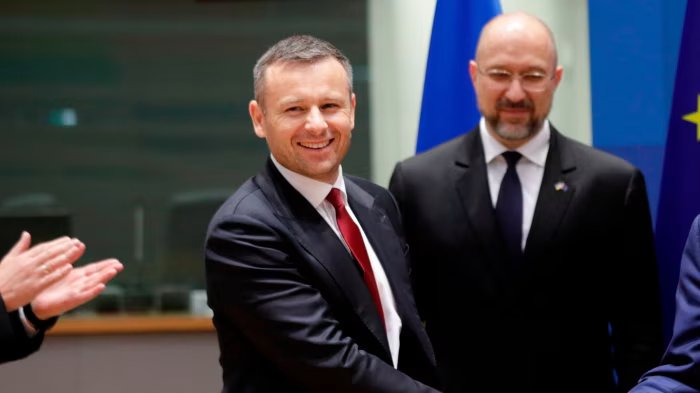Stay informed with free updates
Simply sign up to the War in Ukraine myFT Digest — delivered directly to your inbox.
Ukraine has failed to secure a debt restructuring that is seen as key to financing its war effort against Russia’s invasion, despite Kyiv offering investors a cash payout ahead of a new IMF loan.
Ukraine’s finance ministry said on Thursday that it had ended recent talks over $2.6bn in controversial growth-linked debt without a deal, just as Kyiv is seeking a multibillion dollar expansion of a $15.5bn bailout from the fund along with European financial support.
Kyiv offered cash and bonds to replace its so-called GDP warrants in talks with a committee of big holders that includes hedge funds VR Capital and Aurelius Capital, according to terms released on Thursday.
Negotiations were bogged down after the committee pushed for insurance against the possibility Kyiv may ask bondholders to take further losses as the conflict drags on, after a $20bn restructuring of its bonds last year, said people familiar with the discussions.
Ukraine will seek more talks with all investors but “the lack of progress in narrowing the economic gap between the parties over the course of the recent discussions is regrettable”, Sergii Marchenko, Ukraine’s finance minister, said.
“We have too many things to rebuild in our country — we are determined to make sure investor trust is not one of them,” Marchenko added.
The bondholder committee did not immediately respond to a request for comment.
The difficulty of reaching a deal reflects extreme uncertainty among Ukraine’s investors over when the war will end, despite Donald’s Trump’s push for a ceasefire and US pressure on Russia’s President Vladimir Putin.
Ukraine issued the warrants as part of a previous debt restructuring a decade ago following Russia’s annexation of Crimea. It left them out of last year’s restructuring because of their complexity but needs a deal to comply with IMF terms.
The securities offer annual payouts if economic growth in the prior year exceeded 3 per cent, which could be worth billions of dollars in a postwar boom.
The committee of warrant investors has sought stronger so-called “loss reinstatement” in any second restructuring, and for their new bonds to be restructured separately to Ukraine’s other bonds in that event.
Ukraine’s official creditors and the IMF will need to sign off any final deal on the warrants. Kyiv’s European backers have been reluctant to approve cash payouts to investors as they gear up to provide more support, people familiar with the matter said.
IMF support for Ukraine also depends on whether European countries approve a €140bn loan to Kyiv backed by Russia’s frozen assets.
Ukraine held initial talks with the GDP warrant committee in April. After these talks failed, Kyiv skipped a payment of more than $600mn that was due on the debt in May. A second round of talks began last month during the IMF annual meetings.
Prices for the warrants have risen sharply in the past fortnight to 86 cents on the dollar, close to a post-invasion high.
Ukraine initially wanted investors to convert their warrants into bonds from last year’s restructuring, some of which will make extra payouts if Ukraine’s GDP beats forecasts in 2028 in return for paying no interest until 2027.
Ukraine’s bonds with the 2028 GDP payout trade at 50 cents on the dollar. Citi analysts said this payout was “increasingly unlikely” if the war continues to depress growth next year.
In the latest talks, Ukraine instead offered new bonds to warrant investors.

